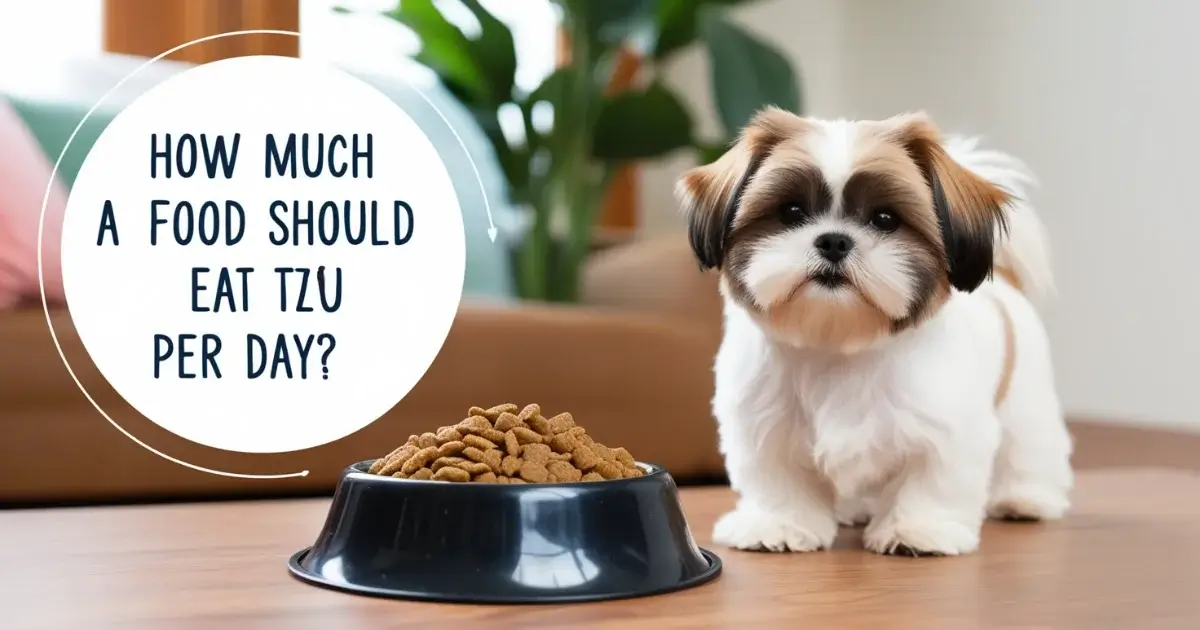How Much Food Should a Shih Tzu Eat Per Day? Essential Feeding Tips
Feeding your Shih Tzu the right amount each day is crucial to their health and energy levels. But how much food should a Shih Tzu eat per day? The right amount depends on their age, weight, and activity level. Let’s take a look at daily feeding tips to ensure your Shih Tzu has a nutritious and balanced diet.
Table of Contents
Key Factors That Affect a Shih Tzu’s Diet
Age and Growth Stages
Shih Tzu puppies need frequent meals to support fast growth. For puppies under 3 months, free-feeding (leaving food out all day) is helpful, as they have small stomachs and high energy needs. When they reach 3-6 months, offer three meals daily. For 6-12 months, maintain three meals but gradually transition to adult portions.
For adult Shih Tzus, 2-3 meals daily provide stable energy and aid digestion. Senior Shih Tzus benefit from smaller, more frequent meals and nutrient-rich diets that include joint support. Regular meal times help maintain a steady weight.

Weight and Activity Level
More active Shih Tzus or those with lean muscle require slightly larger portions. Indoor or less active Shih Tzus need moderate portions to avoid weight gain. Adjusting portions based on energy levels is key to maintaining healthy weight.
How Much Food Should a Shih Tzu Eat Per day?
So, how much food should a Shih Tzu eat a day? Here’s a daily feeding guide:
| Age | Meals per Day | Suggested Portion Size |
| Under 3 Months | Free-feeding | Food available all day |
| 3-6 Months | 3 meals | Small portions each meal |
| 6-12 Months | 3 meals | Gradual shift to adult portions |
| Adult Shih Tzu | 2-3 meals | ¾ to 1 ¼ cups per day |
| Senior Shih Tzu | 2-3 meals | Smaller, nutrient-rich portions |
Every Shih Tzu is unique, so monitor their weight and energy. Regular adjustments and vet check-ups ensure you meet their specific dietary needs.
Choosing the Right Food for Shih Tzus
Wet vs. Dry Dog Food
Wet food is flavorful and helps with hydration, while dry kibble is better for dental health. Mixing a small amount of wet food with dry kibble offers the best of both worlds.

Grain vs. Grain-Free Diets
Shih Tzus with grain allergies may benefit from grain-free diets. Some grains, like brown rice and quinoa, are gentle on digestion and are good for most dogs. If unsure, ask your vet before making changes.
Ingredients to Avoid
Look for foods without fillers, artificial preservatives, or by-products. Natural preservatives like mixed tocopherols are healthier. Foods sourced from North America generally meet quality standards. This attention to ingredients supports long-term health.
Adjusting Diet Based on Size and Weight
The amount of food a Shih Tzu eats daily should match their weight. Here’s a simple portion guide:
| Weight | Daily Portion |
| 10 pounds | Around ¾ cup |
| 12 pounds | Around 1 cup |
| 15 pounds | Around 1 ¼ cups |
How to Check if Your Shih Tzu is a Healthy Weight
To tell if your Shih Tzu is at a healthy weight, check for a slight waist when looking from above. You should feel ribs easily without seeing them. Overweight dogs may have no visible waist, while underweight dogs have more prominent ribs. Regularly monitoring weight keeps your dog on track.
Sample Feeding Schedule for Shih Tzus
A consistent feeding schedule helps Shih Tzus develop healthy eating habits. Here’s a recommended schedule based on age.
Puppies
Feed puppies 3-4 times daily to support growth:
- Morning: 7:00 am
- Mid-Morning: 11:00 am
- Afternoon: 3:00 pm
- Evening: 7:00 pm
Adult and Senior Shih Tzus
For adult and senior Shih Tzus, feeding twice daily with a possible midday snack works well. Stick to a regular schedule:
- Morning: 8:00 am
- Evening: 6:00 pm
Regular mealtimes help prevent acid reflux and improve digestion, making mealtimes pleasant for both you and your Shih Tzu.
Conclusion: Supporting Your Shih Tzu’s Health with the Right Diet
Feeding your Shih Tzu the right amount of food daily supports their health and energy. By sticking to a feeding schedule that Shih Tzu eat per day and making informed food choices, you’re setting up your Shih Tzu for a long, happy life. Always remember to consult your vet if you’re unsure about any dietary needs or adjustments.
Creating a balanced diet doesn’t just benefit their body—it keeps them happy, too. Following these feeding guidelines means that each mealtime contributes to your Shih Tzu’s wellness.
FAQs
What foods should a Shih Tzu avoid?
Shih Tzus should avoid foods with fillers, artificial preservatives, and by-products. Avoid ingredients like soy, wheat, and corn, which can cause allergies and digestive issues in some Shih Tzus.
How much food should a Shih Tzu puppy eat?
Shih Tzu puppies need frequent, smaller meals throughout the day. Up to 3 months, they can be free-fed, while 3-6 month-old puppies should have three meals daily for balanced growth.
What kind of dog food should a Shih Tzu eat?
Shih Tzus do best on high-quality dog food with balanced protein, fats, and carbohydrates. Both dry and wet food options are suitable consider mixing for added texture and taste appeal.
What should a grown Shih Tzu's eating schedule be?
Adult Shih Tzus benefit from 2-3 meals a day on a regular schedule. Consistent feeding times help avoid digestive issues and maintain a steady energy level throughout the day.







